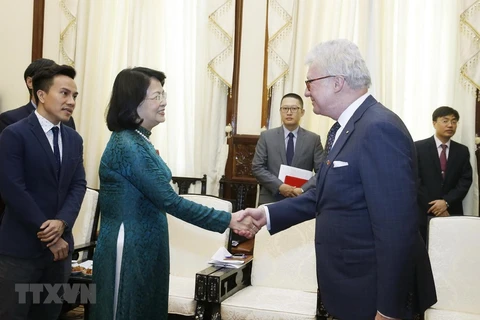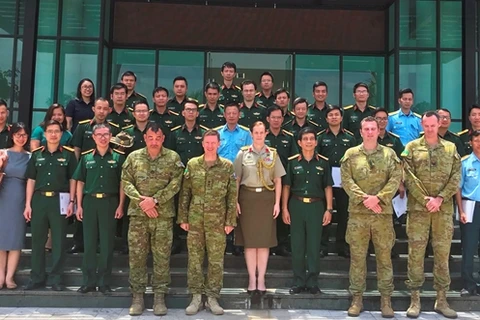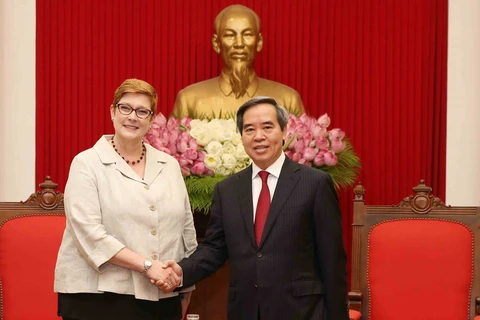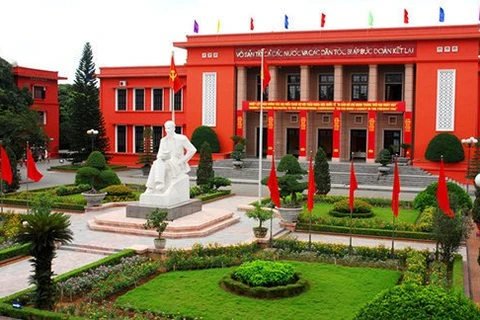Hanoi (VNA) – The Forum on Women’s Empowerment in the Foreign Service in the Digital Age, co-organised in Hanoi on October 3 by Vietnam’s Ministry of Foreign Affairs and Australia’s Department of Foreign Affairs and Trade, adopted a joint statement.
Following is the full text of the joint statement:
1. On June 12, 2019, Pham Binh Minh, Deputy Prime Minister and Minister of Foreign Affairs of Vietnam and the Hon Marise Payne, Senator of Australia, Minister for Foreign Affairs and Minister for Women, signed the Memorandum of Understanding (MoU) on the empowerment of women in the foreign service for comprehensive and extensive international integration in the digital age, thus strengthening cooperation between the two ministries and contributing to deepen the Strategic Partnership between Vietnam and Australia.
2. As a first step towards implementing this MoU, Vietnam’s Ministry of Foreign Affairs (here in after referred to as “MOFA”) and Australia’s Department of Foreign Affairs and Trade (hereinafter referred to as DFAT), co-hosted the Forum on Women’s Empowerment in the Foreign Service in the Digital Age on October 3, 2019 in Hanoi. The event gathered around 80 participants, including H.E Amb. Bui Thanh Son, First Deputy Minister, MOFA of Vietnam, H.E Ms. Julie Heckscher, First Assistant Secretary, DFAT of Australia, various Australian and Vietnamese Ambassadors, Ambassadors of the Informal Gender Coordination Group and high-level diplomats and other high-level officials of MOFA and DFAT.
3. The Forum took place amid an era of accelerated realisation of gender equality and women’s empowerment, as part of the on-going global efforts to fight inequalities and not leave anyone behind. 2020 marks the 75th year of the Charter of the United Nations, the first international agreement to affirm the principle of equality between women and men and the 25th anniversary of the adoption of the Beijing Declaration and Platform for Action, a historic roadmap for the empowerment of women and girls.
4. As part of this global movement, the Forum provided a platform for both sides and partners to share experiences in achieving gender equality, tackle prevailing gender bias, identify the policies needed and set priorities for actions to promote women’s empowerment in the foreign service in the digital age. Participants agreed that expanding women’s empowerment and embedding gender equality were critical to the success of, and economic growth in, both countries. They assessed the impacts of digital economy on the foreign service as well as the new requirements of digital diplomacy. In this regard, the Forum commended the two sides for their efforts and achievements in bridging the gender gap and promoting women’s empowerment over the years.
5. During the Forum, participants examined strategies to assist women develop leadership skills set in diplomacy, and promote women’s meaningful participation and voice in all decision-making and management as a means of achieving sustainable and inclusive economic growth. They looked at the issues facing women diplomats in both countries and reviewed where efforts to empower women have worked and the challenges that lie ahead. Participants also exchanged views on how to harness the opportunities and respond to the challenges associated with digitalisation for women in the foreign service, sharing experiences on how to provide women with the skills sets needed to thrive in the digital era in the 21st century.
6. To take this cooperation forward, MOFA and DFAT are committed to further strengthening cooperation in enhancing the understanding of gender norms and behaviors for male and female officers in foreign services. This cooperation will be delivered through training and capacity building for male and female officers on gender norms and behaviors, gender equality, women’s empowerment, conscious and unconscious bias and other issues.
7. MOFA and DFAT committed to continue building stronger networks and strengthening ties between female diplomats. Both sides look forward to further promoting women’s empowerment in the foreign service, deepening bilateral ties and to closer cooperation in multilateral fora on gender equality and other issues of common concern, especially when Vietnam takes on the role of ASEAN Chairmanship 2020./.
VNA
























